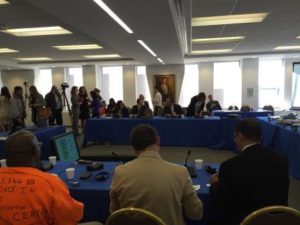The Diplomatic Dance of Human Rights Hearings – A View From the Bridge
During the week of October 27, 2014 Sarracina Littlebird (JD ’16), along with four other students in the International Human Rights and Conflict Resolution Clinic and their supervisors, attended the 153rd Period of Sessions of the Inter-American Commission on Human Rights in Washington, DC. Last week, we featured Naomi Tom’s (JD ’16) account of the experience. Below, Cina shares her perspective.
The IACHR hearings brought to light the power of naming and shaming for me. Although the IACHR’s mandate endows it with certain authority over member states, the core of the power that IACHR wields seems to lie in the way it brings accusations to public and international attention.
During the hearings, Commissioners engaged in an artful diplomatic dance. They softly communicated their concerns about state actions and avoided coming out with guns blazing, throwing pointed accusations at the states, or levying heavy threats of enforcement action. One reason for this nuanced tactic lies in IACHR’s interest in supporting a cooperative environment by avoiding the alienation of participating states with threats or forceful public admonitions. In any other confrontation context – where no concrete punishment or threat is being levied – the defendant has an easy out by simply denying the accusations. Yet that generally does not happen in the Inter American Commission’s system. Even with no direct threat of punishment, the states often still choose to modify their behaviors (or at least say that they will/are) in response to the accusations of the petitioners at these public hearings. I was puzzled as to why.
-

- IHRCRC students observed hearings brought by petitioners across the Americas, including migrants alleging abuse in detention facilities in the USA
My thought is that the change must be precipitated by the public documentation of these hearings and, by extension, the underlying allegations. There is something about the presence of media and representatives from other countries recording the accusations brought against them that behooves respondent states to at least appear that they are doing something to combat the manifold issues raised by the petitioners. The fact that reputation holds so much power is fascinating to me. Understandably, states desire to appear honorable in the eyes of other countries so that those nations in turn will not hesitate to engage politically and economically with them.
But I wonder if some of this seeming cooperation among states is attributable to a basic human instinct that abhors criticism. Feedback from peers is an important guideline toward appropriate behavior and growth. And, in order for feedback to work, one must pay attention when others are saying that what they are doing is wrong. In fact, not reacting to criticism from peers (or feeling shame for one’s wrongful actions) is what distinguishes a sociopath. Does this indicate that the success of human rights work is gained through appealing to the workings of a rational collective psyche, rather than for more logical reasons?
The week in D.C. definitely made me appreciate all of the psychological and emotional massaging and negotiating that takes place in human rights work. It certainly appears as though working with someone’s psyche is a more potent tool than working with someone’s actions or the “hard” facts of a situation in this field. ◊
